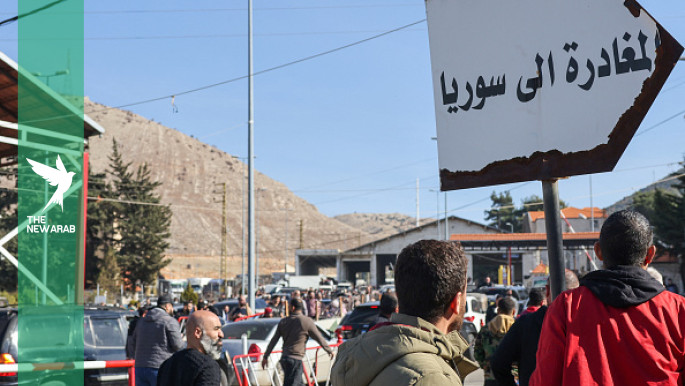Pressure on Syrians in Lebanon has intensified in recent years amid a severe economic crisis since 2019 and a recent war with Israel [Getty]
Lebanon is processing an additional 71,000 applications for the voluntary repatriation of Syrian refugees currently in the country, the country’s Minister of Social Affairs Haneen Sayed said, with a government body formed to oversee the process.
Sayed told local television that 162,000 cases of refugees seeking to return had already been finalised, with the latest batch now under review.
“The Syrian side is cooperative in this matter,” she added.
Pressure on Syrians in Lebanon has intensified in recent years amid a severe economic crisis since 2019 and a recent war with Israel.
Public hostility toward Syrians has grown, fuelled by incidents such as last year’s killing of Lebanese Forces official Pascal Sleiman, which triggered a wave of anti-Syrian violence.
The first phase of Lebanon’s “voluntary return” programme for migrants and refugees, coordinated with the UN refugee agency (UNHCR) since the fall of Syrian President Bashar al-Assad in December 2024, was officially launched on 29 July under Lebanese government supervision.
In coordination with the International Organisation for Migration (IOM), Lebanon’s General Security facilitated the return of 71 people from 16 families via the Masnaa border crossing, the only route used in this pilot phase.
Since Assad’s ouster by a coalition of mostly Islamist rebel groups, more than 126,000 Syrian refugees have been removed from UNHCR’s registers, according to the agency. Other waves of returns described by Lebanese authorities as voluntary have also taken place this year.
As of mid-2025, Lebanon hosts approximately 1.4 to 1.5 million displaced Syrians, of these, about 722,000 Syrian refugees are registered with the UNHCR.
Many were living in poverty and deprived of the opportunities needed to escape the drudgery of life in the refugee camps.
As of early June, over seven months after the regime change in Damascus, Syria still had around 13.5 million refugees and internally displaced people combined, according to monitors, following 14 years of civil war that killed more than 610,000 people, including 160,000 civilians and 25,000 children.
Switzerland refuses to repatriate citizens held in Syria
Meanwhile, Switzerland is maintaining its refusal to repatriate citizens suspected of belonging to the Islamic State group (IS) from abroad, including those held in the al-Hol and Roj camps in northeast Syria, the Swiss foreign ministry confirmed on Tuesday in response to questions from Swiss public broadcaster Swissinfo.
The ministry said the March 2019 government decision had remained in force and Switzerland would not initiate returns or issue passports to these individuals, providing only consular protection “within the limits of what is possible” in cases of direct threats to life or physical safety.
Swiss officials have been in contact with the detainees and Kurdish authorities, including a consular visit to Roj camp, where a Swiss woman and her daughter are held. The mother rejected an offer to have her child repatriated without her.
This stance contrasts with that of some European countries, including Bosnia, Kosovo, and North Macedonia, which have repatriated IS-linked fighters for trial.
Others, like Sweden, France, and Belgium, have prosecuted returnees for war crimes, while Norway, Sweden, and Denmark have introduced de-radicalisation and reintegration programmes.
According to the Syrian Democratic Forces (SDF), northeast Syria holds around 12,000 IS fighters from 55 countries, mostly Syrian and Iraqi, in various detention centres. The largest is the Ghweiran prison in Hassakeh, which houses about 5,000 detainees and has seen previous armed uprisings.
Civilians with no connection or only perceived links to IS, particularly children, are being held in SDF-run camps, something rights groups say is unlawful.
Security concerns have risen in al-Hol camp, south of Hassakeh, where the administration has reported organised activity by IS sleeper cells led by women in the foreign migrants’ section. These groups, known as the “hisbah” after the IS “morality” police force, have carried out arson attacks and vandalism targeting humanitarian facilities, forcing some organisations to suspend operations.
On 30 July, the SDF, backed by the US-led coalition, arrested the camp’s IS military leader, Mahmoud Safi al-Awwal, and a cleric tasked with recruiting children, Abdel Razzak Mahmoud al-Salama, according to the SDF-affiliated Hawar News Agency.
The US State Department separately announced it had repatriated a minor from a displacement camp in northeast Syria, stressing that the only sustainable solution to the humanitarian and security crisis in such camps is for countries to take back their nationals, rehabilitate and reintegrate them, and ensure accountability, including for former IS fighters.


